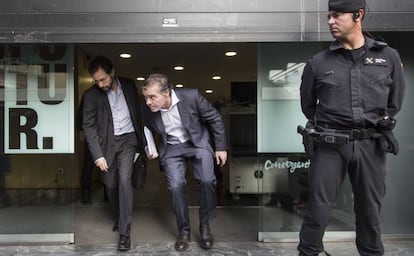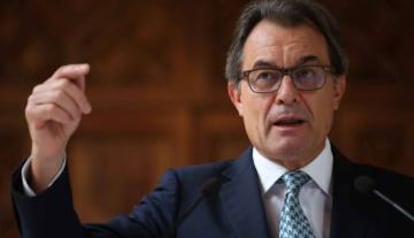How the bid for Catalan independence swept corruption under the rug
The secessionist agenda was pushed forward while evidence of graft by the ruling party piled up

In February 2013, the independence process was still in its early stages of development, but the Catalan premier at the time, Artur Mas, was already feeling the heat. During a short first tenure that began in late 2010, he had slashed the health and education budgets with support from the regional branch of the Popular Party (PP). Faced with widespread criticism, he called elections for November 2012, two years ahead of time, and announced a referendum on independence. The ball was now rolling.

By then, a string of corruption cases involving Mas’s own Democratic Convergence of Catalonia (CDC) party had begun to reach the courts.
The Palau case, involving large-scale embezzlement by managers of Barcelona’s landmark concert hall Palau de la Música, produced solid evidence that CDC had taken €6.6 million in illegal commissions in exchange for public works contracts during the last government of Jordi Pujol (1999-2003), who is considered the founding father of Catalanism.
In 2013, Mas brought together prosecutors, judges and high-ranking officials to fight corruption for the sake of the independence push
And the ITV case involved Jordi Pujol’s son Oriol, who was also the number-two official at CDC. This summer, Oriol Pujol was sentenced to two-and-a-half years in prison for taking bribes and for influence peddling. And then there was the investigation into a foundation that may have been used to channel private donations to CDC.
So in February 2013, Mas brought together prosecutors, judges and high-ranking officials at a brainstorming session to fight corruption for the sake of the independence push. “We are at a very delicate juncture from the viewpoint of the economy and the national process,” said Mas. “Now more than ever, we need a perception that things work well here, and that people here behave honestly.”
Nearly five years after that gathering, the promises of regeneration have yet to produce any results. Mas was prosecuted over the non-binding referendum of November 9, 2014 (the predecessor to the one held on October 1 of this year) and convicted of disobedience. And CDC responded to new corruption cases by reinventing itself as the European Democratic Party of Catalonia (PDeCAT), under which it ran in the 2015 elections in tandem with the Catalan Republican Left (ERC), securing a narrow victory.
Don’t look back
Among non-secessionist parties, the most commonly held view is that Mas and CDC – a party that had not pushed for independence in all its decades in power – suddenly embraced the secessionist project as a form of political survival.
On one hand, social indignation over the budget cuts was so intense that in 2011, Mas and several other regional deputies had to be flown into the assembly in a helicopter to avoid the angry crowds surrounding the building.
On the other hand, CDC had to do something about the tide of corruption cases tarnishing its image.

“They covered up corruption with a great big estelada flag,” says Inés Arrimadas, head of Ciudadanos, a center-right unionist party that polls show could be the most-voted force at the upcoming December 21 election.
“We have heard things like ‘Espanya ens roba’ [Spain robs us], the fateful phrase that they have used to conceal how much was being stolen in Catalonia with the three, four and five percent [commissions],” she adds.
Secessionists, for their part, feel that Spanish Prime Minister Mariano Rajoy is using the independence push as a cover for the corruption cases affecting his own Popular Party (PP). By fighting against Catalan independence, they argue, the central government is distracting people from other issues.
In any case, corruption cases have continued to emerge throughout the independence push. In the summer of 2014, there was the “three-percent case,” involving alleged bribes taken by CDC for awarding public works contracts – the amount of the bribe was said to be roughly three percent of the value of the contract.
Social indignation over cuts was so intense that regional deputies had to be flown into the assembly in a helicopter to avoid angry crowds
And then there was the confession by Jordi Pujol regarding a fortune stashed away in Andorra; he claimed it was a family inheritance, but investigators suspected a different origin.
But all of these cases have been swept under the rug of independence. There is barely any public debate going on about how to fight corruption anymore, and if the issue does come up at rallies, it is merely as a weapon to be used against one’s rival.
The ousted premier Carles Puigdemont illustrated this position recently during a video link from Brussels, where he has been living since late October after fleeing Spain to avoid action by the courts over the illegal independence declaration.
Puigdemont said that Catalans have a memory, unlike “the PP’s hard drives,” alluding to a case involving former PP party treasurer Luis Bárcenas.
But Puigdemont was careful to avoid mentioning all the cases affecting his own CDC party (now rebranded PDeCAT). Neither he nor his team seem to remember the party’s old promises to improve government transparency to avoid new corruption cases. This is no longer a priority – not even now that the courts are about to reach a verdict in the Palau case, which might prove for the first time that CDC engaged in illegal party financing.
Meanwhile, other parties are tiptoeing around the issue. Marta Rovira, the number two official at the Catalan Republican Left (ERC) – which, like Ciudadanos, is at the top of voter intention polls – has merely mentioned the need for “a republic without corruption.” And ERC official Toni Castellà has asked “honest” people who used to vote for CDC to now vote for ERC.
Neither the anti-capitalist CUP nor Catalunya en Comú-Podem have made a big deal of the fight against corruption
Meanwhile, the head of the Catalan Socialists, Miquel Iceta, says that he will be an honest president: “Not just because I won’t steal, but also because I won’t deceive Catalans.”
To the left of the political spectrum, neither the anti-capitalist CUP nor Catalunya en Comú-Podem have made a big deal of the fight against corruption at their rallies. Even so, their platforms have more specific proposals than other parties.
CUP wants “a republic with zero corruption,” for illicit enrichment to be incorporated into the Criminal Code, and more resources for the police and judiciary. Meanwhile, the Catalan branch of Podemos and its associates want to bar companies that have subsidiaries in tax havens from doing business with public agencies.
For its part, the PP has merely pledged to conduct “a clean and loyal government” and to refrain from including candidates under court investigation on its ticket.
English version by Susana Urra.
Tu suscripción se está usando en otro dispositivo
¿Quieres añadir otro usuario a tu suscripción?
Si continúas leyendo en este dispositivo, no se podrá leer en el otro.
FlechaTu suscripción se está usando en otro dispositivo y solo puedes acceder a EL PAÍS desde un dispositivo a la vez.
Si quieres compartir tu cuenta, cambia tu suscripción a la modalidad Premium, así podrás añadir otro usuario. Cada uno accederá con su propia cuenta de email, lo que os permitirá personalizar vuestra experiencia en EL PAÍS.
¿Tienes una suscripción de empresa? Accede aquí para contratar más cuentas.
En el caso de no saber quién está usando tu cuenta, te recomendamos cambiar tu contraseña aquí.
Si decides continuar compartiendo tu cuenta, este mensaje se mostrará en tu dispositivo y en el de la otra persona que está usando tu cuenta de forma indefinida, afectando a tu experiencia de lectura. Puedes consultar aquí los términos y condiciones de la suscripción digital.








































